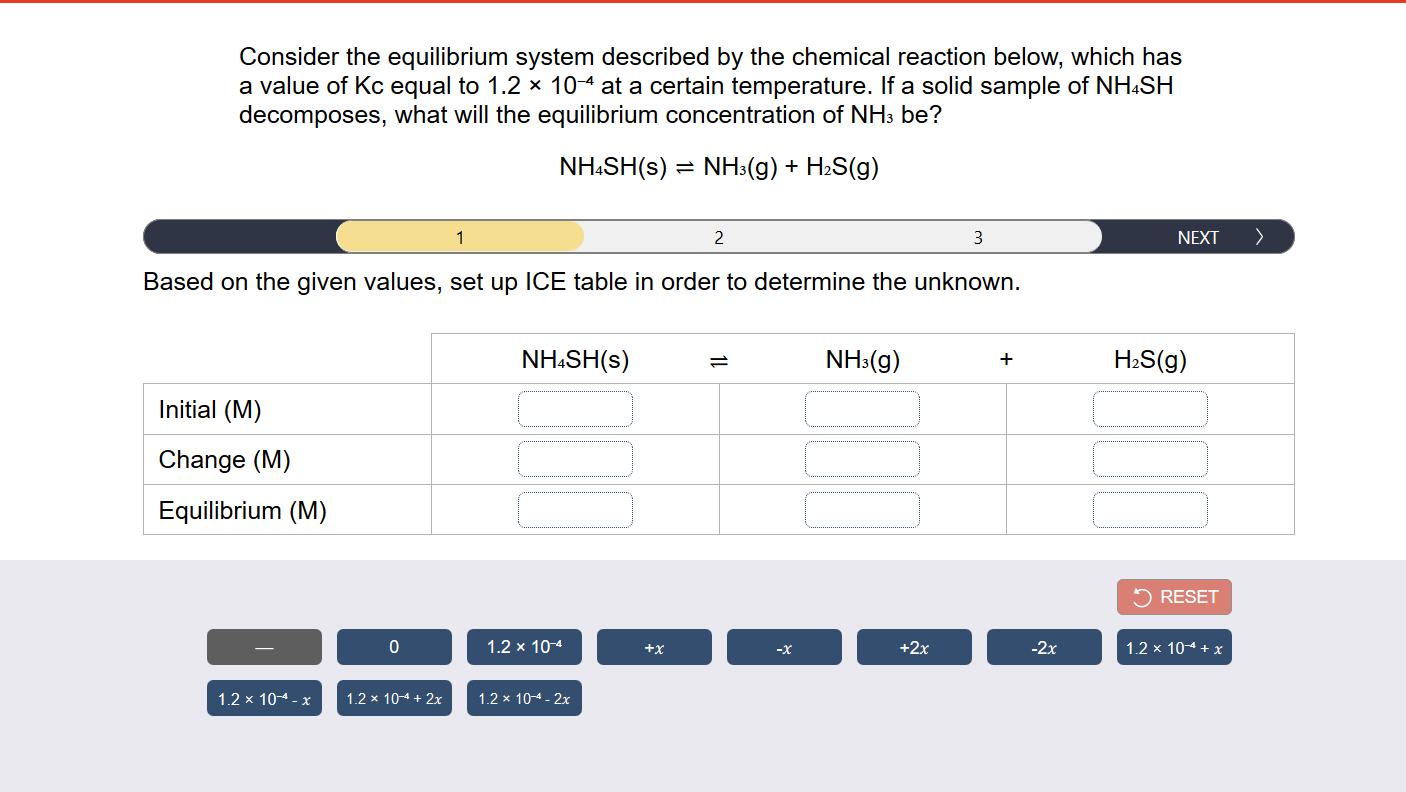Consider the equilibrium system described by the chemical reaction below, which has a value of Kc equal to 1.2 x 104 at a certain temperature. If a solid sample of NH.SH decomposes, what will the equilibrium concentration of NH3 be? NH:SH(s) = NH3(g) + H2S(g) 1 2 3 NEXT > Based on the given values, set up ICE table in order to determine the unknown. NH.SH(s) NH:(g) H2S(g) Initial (M) Change (M) Equilibrium (M) RESET 1.2 x 104 +x +2x -2x 1.2 x 104 + x 1.2 x 104 - x 1.2 x 104 + 2x 1.2 x 104- 2x
Consider the equilibrium system described by the chemical reaction below, which has a value of Kc equal to 1.2 x 104 at a certain temperature. If a solid sample of NH.SH decomposes, what will the equilibrium concentration of NH3 be? NH:SH(s) = NH3(g) + H2S(g) 1 2 3 NEXT > Based on the given values, set up ICE table in order to determine the unknown. NH.SH(s) NH:(g) H2S(g) Initial (M) Change (M) Equilibrium (M) RESET 1.2 x 104 +x +2x -2x 1.2 x 104 + x 1.2 x 104 - x 1.2 x 104 + 2x 1.2 x 104- 2x
Chemistry: An Atoms First Approach
2nd Edition
ISBN:9781305079243
Author:Steven S. Zumdahl, Susan A. Zumdahl
Publisher:Steven S. Zumdahl, Susan A. Zumdahl
Chapter12: Chemical Equilibrium
Section: Chapter Questions
Problem 1ALQ: Consider an equilibrium mixture of four chemicals (A, B, C, and D, all gases) reacting in a closed...
Related questions
Question

Transcribed Image Text:Consider the equilibrium system described by the chemical reaction below, which has
a value of Kc equal to 1.2 x 104 at a certain temperature. If a solid sample of NH.SH
decomposes, what will the equilibrium concentration of NH3 be?
NH:SH(s) = NH3(g) + H2S(g)
1
2
3
NEXT
>
Based on the given values, set up ICE table in order to determine the unknown.
NH.SH(s)
NH:(g)
H2S(g)
Initial (M)
Change (M)
Equilibrium (M)
RESET
1.2 x 104
+x
+2x
-2x
1.2 x 104 + x
1.2 x 104 - x
1.2 x 104 + 2x
1.2 x 104- 2x
Expert Solution
This question has been solved!
Explore an expertly crafted, step-by-step solution for a thorough understanding of key concepts.
This is a popular solution!
Trending now
This is a popular solution!
Step by step
Solved in 4 steps with 2 images

Knowledge Booster
Learn more about
Need a deep-dive on the concept behind this application? Look no further. Learn more about this topic, chemistry and related others by exploring similar questions and additional content below.Recommended textbooks for you

Chemistry: An Atoms First Approach
Chemistry
ISBN:
9781305079243
Author:
Steven S. Zumdahl, Susan A. Zumdahl
Publisher:
Cengage Learning

Chemistry
Chemistry
ISBN:
9781305957404
Author:
Steven S. Zumdahl, Susan A. Zumdahl, Donald J. DeCoste
Publisher:
Cengage Learning


Chemistry: An Atoms First Approach
Chemistry
ISBN:
9781305079243
Author:
Steven S. Zumdahl, Susan A. Zumdahl
Publisher:
Cengage Learning

Chemistry
Chemistry
ISBN:
9781305957404
Author:
Steven S. Zumdahl, Susan A. Zumdahl, Donald J. DeCoste
Publisher:
Cengage Learning


Chemistry: The Molecular Science
Chemistry
ISBN:
9781285199047
Author:
John W. Moore, Conrad L. Stanitski
Publisher:
Cengage Learning

Chemistry: Principles and Reactions
Chemistry
ISBN:
9781305079373
Author:
William L. Masterton, Cecile N. Hurley
Publisher:
Cengage Learning

Chemistry & Chemical Reactivity
Chemistry
ISBN:
9781133949640
Author:
John C. Kotz, Paul M. Treichel, John Townsend, David Treichel
Publisher:
Cengage Learning